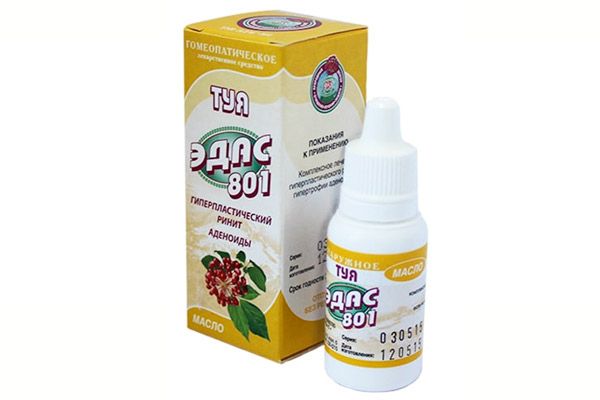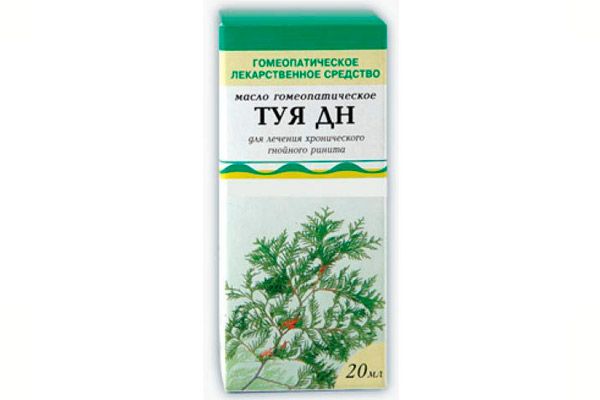Medical expert of the article
New publications
Preparations
Thuja oil EDAS 801 and DN for adenoids: treatment regimens, how to drop
Last reviewed: 04.07.2025

All iLive content is medically reviewed or fact checked to ensure as much factual accuracy as possible.
We have strict sourcing guidelines and only link to reputable media sites, academic research institutions and, whenever possible, medically peer reviewed studies. Note that the numbers in parentheses ([1], [2], etc.) are clickable links to these studies.
If you feel that any of our content is inaccurate, out-of-date, or otherwise questionable, please select it and press Ctrl + Enter.
Adenoids, or adenoid growths, are a pathology associated with an increase in the pharyngeal tonsil. This disease is predominantly childhood and reaches its peak development at the age of 4 to 7 years.
If adenoids progress to 2-3 degrees, specialists most often recommend surgical treatment. After surgery, nasal breathing generally returns to normal, but this type of therapy does not guarantee the absence of relapses in the future.
In addition to surgical intervention, there are several ways to treat adenoids. Among them are laser and homeopathic treatment, in particular, the use of thuja oil.
Does thuja oil help with adenoids?
Studies have shown that after constant use of the drug, 70% of subjects had no pathogenic microorganisms on the adenoids and positive dynamics. In this regard, there is reason to believe that thuja oil helps with adenoids, and there are also positive reviews of the medication.
 [ 1 ]
[ 1 ]
Indications thuja oil for adenoids
Thuja oil has been used for centuries to treat adenoids. Thuja was also called the “tree of life” and was used to treat runny nose, bronchitis, otitis, tracheitis and other pathologies, as well as to strengthen the general condition.
Release form
Concentrated thuja essential oil is not used for adenoids. You can either dilute thuja oil for adenoids (5 drops per 200 ml of boiling water) or use ready-made medications. Specialists prescribe homeopathic medicines based on this substance for adenoids for children and adults.
Thuja Edas-801
The active ingredient in this medicine is Thuja occidentalis D6.
Release form. The drug is available in the form of oil for external use.
Pharmacokinetics and pharmacodynamics. Thuja oil Edas-801 has a metabolic effect on the body, accelerates the process of epithelial regeneration in the nasopharynx, normalizes the secretory processes of the skin and mucous membranes.
Indications for use. Pathologies of the mucous membrane and skin.
Method of administration and dosage. 4-5 drops of oil intranasally for adenoids 3 times a day.
Contraindications for use. Taking the drug during pregnancy and breastfeeding is permitted only upon prescription from a specialist, if the therapeutic effect on the mother exceeds the possible consequences for the fetus.
Overdose. No cases have been reported.

Side effects. In case of hypersensitivity to the components of the drug, there is a possibility of an allergic reaction.
Shelf life: one year.
Storage conditions: The closed bottle should be kept in a dark place at a temperature of no more than 25 degrees.
Interaction with other drugs. Has no contraindications.
 [ 2 ]
[ 2 ]
Thuja DN
The active ingredient in this medicine is Thuja occidentalis D3.

Release form. The drug is available in the form of an ointment or oil for external use.
Pharmacokinetics and pharmacodynamics. Pharmacological characteristics are determined by the properties of the active substance.
Indications for use: ENT diseases.
Method of administration and dosage. 3 drops of the medicine intranasally 3 times a day. The ointment applied to a tampon is left in the nasal passages 3 times a day.
Contraindications for use. Acute rhinitis, hypersensitivity to the active component of Thuja DN oil. Use during pregnancy and breastfeeding is permitted only as prescribed by a specialist, if the therapeutic effect on the mother exceeds the possible consequences for the fetus.
Overdose. No cases have been reported.
Side effects. In case of hypersensitivity to the active substances of the drug, there is a possibility of an allergic reaction.
Shelf life. 5 years.
Storage conditions: The closed bottle should be kept in a dark place where the temperature does not exceed 15 degrees.
Interaction with other drugs. Has no contraindications.
Pharmacodynamics
Thuja oil has antiseptic, vasoconstrictive and anti-inflammatory properties. Due to this, it helps to restore nasal breathing, regenerate the nasopharyngeal epithelium and normalize chemical processes. Immunostimulating functions are known on par with echinacea.
The substances in the drug can affect metabolism.
 [ 3 ]
[ 3 ]
Dosing and administration
The duration of treatment for adenoids is from a week to 1.5 months with a repeat course after 1 month. The drug should be used intranasally with the dosage according to the instructions.
How to drip thuja oil to a child with adenoids:
- The main principle of treatment is to rinse the nose with saline solution or sea water (Dolphin, Nosol, Aquamaris, etc.) before using the drug.
- In some cases, Protargol and thuja oil are used sequentially for adenoids. First, 2 drops of Protargol are instilled, then after 30 minutes - the homeopathic preparation Edas-801 or DN.
- When prescribed by a specialist, the treatment regimen for adenoids with thuja essential oil includes the use of the homeopathic drug Iov Malysh. The use of thuja oil and Iov Malysh simultaneously for adenoids has no contraindications.
 [ 4 ]
[ 4 ]
Attention!
To simplify the perception of information, this instruction for use of the drug "Thuja oil EDAS 801 and DN for adenoids: treatment regimens, how to drop" translated and presented in a special form on the basis of the official instructions for medical use of the drug. Before use read the annotation that came directly to medicines.
Description provided for informational purposes and is not a guide to self-healing. The need for this drug, the purpose of the treatment regimen, methods and dose of the drug is determined solely by the attending physician. Self-medication is dangerous for your health.

